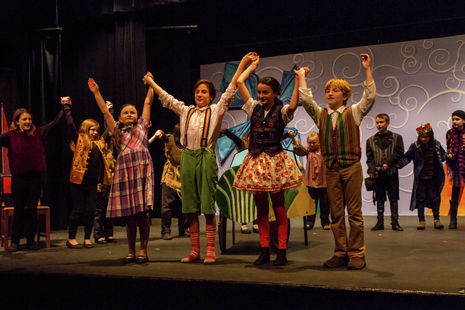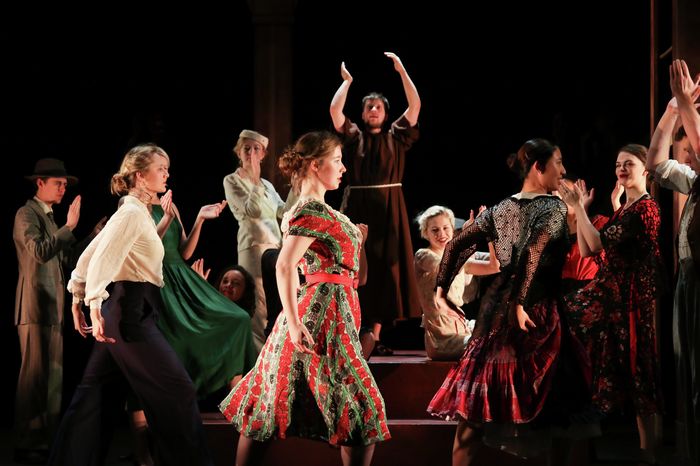The magic of primary school theatre
Isabel Sebode reflects on an early experience of Shakespeare and defends children’s adaptations of the classics

Bitesize Shakespeare, musical adaptations of tragedies, archaic language condensed into the vocabulary of a schoolchild: for many, primary school theatre is their first introduction into the world of the poetic. These low-budget productions are undervalued for their academic and social worth. Children begin by learning how to recite verse from memory and end with a true appreciation of the power, precision and musicality of words.
I, like many other Englings, have always loved theatre. Besides staging The Owl and the Pussycat as no more than a toddler and acting in a psychedelic Alice in Wonderland production with The Beatles as the background music, my fondest memories of theatre are from my fifth-grade performance in a musical adaptation of The Tempest.
Set in a rundown artists’ house (Tacheles in Berlin), this production juxtaposed otherworldly design and a grunge aesthetic with the feeble voices and frail figures of its child actors. Beyond being a simply beautiful experience, in hindsight I have become increasingly aware of the impact that my experience in this play had on my development, and what this may reveal about the significance of children’s plays in general.
Recently reading the original play by Shakespeare brought me closer to the origin of these lines, the magic of which I had already recognised in the fifth grade:
“Full fathom five thy father lies;
Of his bones are coral made;
Those are pearls that were his eyes” (I.2)
Rather than forcing primary school children to articulate words of which they had little understanding, we were handed an adapted version in which poetry became what I can now appreciate it to be: music. Thus, we sang “deep in the sea your father lies/corals for bones and pearls for eyes”, enunciating each syllable with care, cherishing the words as they deserved. Nine years later, I still recall my childish sense of wonder at this first step into a land of dreams.
In this memory I see the beauty of school theatre, if done right. Children are introduced to classics like Shakespeare in a creative and social setting, with the poetry rendered fathomable but, due to its musical accompaniment, no less beautiful. The text morphs into a playground, enriched through set design and the vibrancy of a child’s imagination. Dramatic literature is made accessible and thereby brought back to where it belongs: the hearts of the young and old.
Yet the value of acquainting children with the world of theatre lies not solely in its artistic merit; school performances can encourage a direct engagement with gender relationships, class distinctions and an understanding of how it feels to be someone else. In no way is this phenomenon universal, and it naturally varies between environments, yet even the most minor aspects of school theatre can have a profound influence on the developing minds of their young actors.
“I believe that a smile would cross our Will’s face in seeing a primary school girl take on the role of his grand magician”
For instance, I recall acting a male role, or a boy in my group taking on a female character, when the gender division of the characters in the play did not match that of the pupil cohort. It is plausible that such a blurring of gender roles may engender a certain open-mindedness in the children to whom it is exposed – a liberal approach towards often-debated concepts and consequently a natural acceptance of what adult society still perceives as issues.
Beyond encouraging a progressive view of gender, primary school theatre often modifies the canon towards a more inclusive dramatic norm out of necessity. When I acted in The Tempest as a child, the main character Prospero was rewritten into Prospera, with Antonio becoming Antonia: a subtle, empowering shift that creates female representation in the play beyond the shielded, simple-minded daughter of the powerful magician. In my production, the magician was not only played by a female actor, but rewritten as a female character.
These subtle shifts unsurprisingly come with little backlash, considering the small scale of the productions and the fact that the audience primarily consists of parents. Regardless, this may provide an example for the productions we see at the RSC or Globe (which themselves are increasingly inclusive): we can adapt classic theatrical works, whether Shakespeare’s or another playwright’s, without causing them to turn in their graves. In fact, considering the often progressive and socially aware content of Shakespeare’s work, I believe that a smile would cross our Will’s face in seeing a primary school girl take on the role of his grand magician. Why not?
Between encouraging social awareness and introducing children to the beauty of poetry, primary school theatre is valuable for its positive impact on the development of children’s psychology. It fosters their confidence and helps them to understand the validity of emotional expression – in particular, that a child should not mock his peers for expressing themselves in an unconventional or unusually passionate manner. Self-esteem is developed as the child steps on the stage, which will stand him in good stead in the world of academia, and later, in work.
Primary school theatre allows children to experience art in a way that is digestible. The adapted verse is spoken and understood, not only uttered but pronounced and felt. The visual design of the set and the accompanying music are pleasing to the eye and ear respectively, giving children a coherent and integrated education in artistic beauty. Primary school theatre is evidently far more than a slot in the timetable. It is our introduction to the arts and social sciences via experience, rather than a textbook.
 Features / Beyond the porters’ lodge: is life better outside college?24 February 2026
Features / Beyond the porters’ lodge: is life better outside college?24 February 2026 News / Cambridge academics sign open letter criticising research funding changes22 February 2026
News / Cambridge academics sign open letter criticising research funding changes22 February 2026 Theatre / Footlights Spring Revue? Don’t Mind if I Do!25 February 2026
Theatre / Footlights Spring Revue? Don’t Mind if I Do!25 February 2026 Fashion / The evolution of the academic gown24 February 2026
Fashion / The evolution of the academic gown24 February 2026 News / Student and union protesters hold ‘Trans Liberation Solidarity Rally’ 24 February 2026
News / Student and union protesters hold ‘Trans Liberation Solidarity Rally’ 24 February 2026











![How to Create an Attractive Freelancer Portfolio [5 Tips & Examples]](https://www.varsity.co.uk/images/dyn/ecms/320/180/2026/02/vitaly-gariev-ho2tNOWZYXM-unsplash-scaled.jpg)